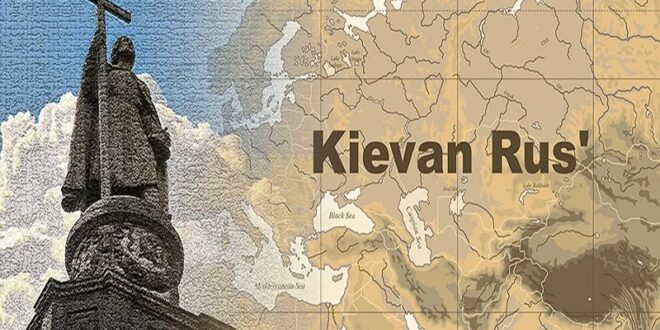Western Civilization exploited Slavic Civilization’s wayward Ukrainian component upon its post-Soviet independence as a sovereign state via the cultivation of extreme nationalism in order to divide-and-rule its Russian-centric Slavic opponent. By launching its special operation, Russia wasn’t engaging in an “imperial war of conquest”, but attempting to avert the West’s own such imperial war by neutralizing Ukraine’s “Trojan Horse” status to that end.
Hungarian Prime Minister Viktor Orban described the Ukrainian Conflict as a “Slavic fraternal war” in comments that he made on Friday. He didn’t elaborate on why he chose that particular phraseology, but his point appears to have been to emphasize the need for others to stop fueling the flames. This aligns with Budapest’s stance towards the conflict, which contrasts with its Western allies’, who instead want to globalize it. That said, his description is still debatable for the reasons that will now be explained.
From the Russian perspective, Ukraine is merely NATO’s proxy for waging a Hybrid War against it. By reframing the conflict as a “Slavic fraternal war”, that bloc’s role in provoking and perpetuating it risks being overlooked in favor of focusing on Russia and Ukraine’s shared ethnic ties. The resultant impression is that Ukraine has been able to hold its own against Russia, which isn’t factually true since it’s only survived so far due to NATO’s assistance.
The Ukrainians’ objections will likely be that they consider themselves to be a distinct ethnic group from Russians so it’s therefore highly offensive to describe the conflict the way that Orban did. From their perspective, reframing it this way risks undermining Ukraine’s sovereign statehood by implying the possibility that more of the land that it claims as its own could – and possibly should – be incorporated into Russia. It also suggests that both parties share guilt for the conflict, which Kiev refuses to admit.
Nevertheless, although neither Russia nor Ukraine is likely to acknowledge it, they each tacitly agree with some of the other’s points. President Putin’s magna opus from July 2021 “On the historical unity of Russians and Ukrainians” concludes by recognizing Ukraine’s distinct ethnic identity and sovereign statehood. Likewise, Kiev doesn’t want the world to think that it survived thus far largely on its own lest those in the West who are against supporting it have yet another argument for cutting off aid.
Having constructively critiqued Orban’s debatable description of the Ukrainian Conflict as a “Slavic fraternal war”, it’s now time to draw attention to its merits. Apart from what was mentioned in the introduction, he might also have wanted to signal his belief in the emerging civilizational paradigm of International Relations. This school of thought posits that civilizations have a similar level of agency as states do in shaping the world order and was partially included in Russia’s latest Foreign Policy Concept.
With that paradigm in mind, the Hungarian leader’s reference to the “Slavic” and “fraternal” nature of the Ukrainian Conflict reconceptualizes its very nature. Instead of being the result of a Western-provoked international security dilemma like Russia regards it as or a so-called “imperial war of conquest” like Ukraine claims, it can now be thought of as an intra-civilizational conflict among fellow Slavs, albeit one provoked and perpetuated by Western Civilization.
To elaborate, there are grounds for reframing Ukraine as a “defector” of sorts from Slavic Civilization due to its efforts to comprehensively distance itself from Russia, to which end it informally allied with the West and conspired with NATO to clandestinely cross its neighbor’s national security red lines. Had Russia eschewed its special operation and instead let events naturally unfold, then Ukraine would have inevitably turned into Western Civilization’s “Slavic Trojan Horse” for Balkanizing Russia.
In that scenario, Slavic Civilization – or what can more accurately be described as Russia’s Eurasian Civilization in which Slavs have historically played the most important state-forming role – would cease to exist with time after its multidimensional conquest by Western Civilization. That outcome would represent the unprecedented expansion of Western Civilization over Northern Eurasia, which could set the stage for a clash with Chinese Civilization in the (then-former) Slavic/Russian lands.
To simplify this civilizational interpretation of the Ukrainian Conflict, Western Civilization exploited Slavic Civilization’s wayward Ukrainian component upon its post-Soviet independence as a sovereign state via the cultivation of extreme nationalism in order to divide-and-rule its Russian-centric Slavic opponent. By launching its special operation, Russia wasn’t engaging in an “imperial war of conquest”, but attempting to avert the West’s own such imperial war by neutralizing Ukraine’s “Trojan Horse” status to that end.
It might be that Orban didn’t intend to reconceptualize the Ukrainian Conflict to that extent by describing it as a “Slavic fraternal war” and only wanted to add a creative rhetorical flourish to his efforts aimed at dissuading fellow Westerners from further fanning the flames. Even if that’s the case, however, his language still inadvertently inspired a novel way of interpreting everything. Experts would therefore to well to build upon this paradigm in order to discover what other insight it holds.
 Eurasia Press & News
Eurasia Press & News


